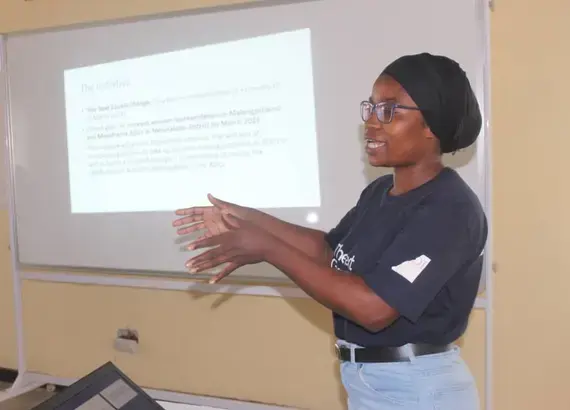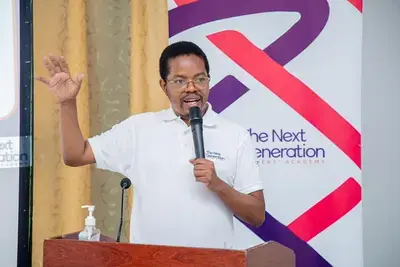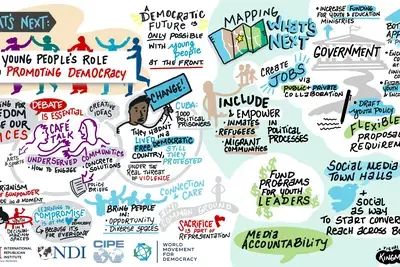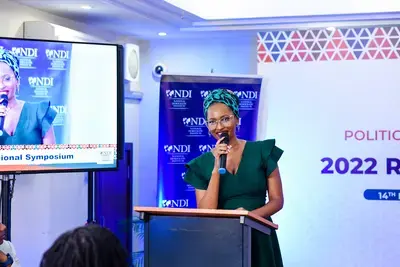
Success Story
"I stood on my own feet” - Next Gen Fellow and Young Malawian Poised to Lead
Faida Phiri and Patrica Mtungila, two recent graduates of NDI’s Next Generation: Youth Leaders’ Academy, are great examples of what can happen when young women leaders invest in themselves. As young civil society organization (CSO) leaders, they joined the academy to become better advocates for Malawi’s women and girls. Having graduated in June, they are moving on to bigger, brighter visions for themselves and their communities.
Patricia, 21, traces her origins as an advocate to a 2016 move to Mzuzu in rural northern Malawi. In that region, young women are typically married off in exchange for a dowry of cows. This has profound consequences on girls when marriage takes priority over education. Average sons are sent to school instead of brilliant daughters. Ultimately, women grow up with less agency and high vulnerability to gender-based violence (GBV). Frustrated by this cycle, Patricia left behind several years of experience in communications and journalism in 2018 to start her own CSO, Purple Innovation for Women and Girls. Since then, Patricia has worked to empower women and eradicate GBV. Purple Innovation recently completed a project funded by the United Nations in which they mobilized communities to develop bylaws to reduce GBV and trained 467 survivors of GBV in entrepreneurship.
Last August, Patricia and the 23 other fellows started the academy. Half of the group, like Patricia and Faida, came with experience in CSOs, while the other half represented Malawi’s political parties. The fellows took courses on concepts and skills that are key to advocacy, such as social justice and conflict management. They then applied what they learned by implementing NDI-funded advocacy projects.
For her project, Patricia took advantage of her background in media to step outside of Purple Innovation’s lane. She trained twenty reporters in investigative reporting and funded their examinations into one of Malawi’s greatest problems - government corruption. She put into practice what the academy taught her about financial management and monitoring and evaluation. She also says she benefited from working alongside the political party fellows. Before the academy, she had not had the opportunity to interact with politicians in a personal way. “Being able to discuss policy with them and just interacting with them socially was a life-changing moment,” she says.
Patricia’s greatest takeaway, however, came from the leadership course facilitated by Ms. Dee Punungwe, an expert in strategic systems. “She spoke about how, as a leader, you need to ensure that you continually invest in yourself so that people will invest in your organization,” says Patricia. “The whole presentation just changed my perspective of who I am as a leader and even the work that I want to do in Purple Innovation.” She is certain this is what she will appreciate most about her time in the academy. “Hearing that showed me that I need to continue doing the work that I am doing. I might face some challenges here and there, but the results are worth it.” She says her next steps are to focus on Malawi’s 2025 general elections and to see what Purple Innovation can do to help more women reach positions of leadership.
Faida, 29, grew up in Nkhotakota, a port town on Lake Malawi. Similar to Patricia, she has been a long-time observer of how women are treated in her community. For the last eight years, she has worked for CSOs, increasingly on projects that focus on serving women now that she is qualified to design her own solutions to gender-based issues. One phenomenon she noticed was that women in rural areas lack physical access to the courts. Faida decided that if women could not come to the courts, the courts should go to them. She developed a program that brings mobile courts to remote communities, making it easier for women to bring their cases forward. Five perpetrators were imprisoned as a result of her initiative.
Faida did all of this before starting as a program manager at Umunthu Plus and joining the academy. She is now a manager, and her main goal in joining the academy was to learn more about leadership. Though she was initially intimidated by the unfamiliar and talented group, she was able to find community and gain new insights.“The academy provided me a chance to collaborate and learn from the best,” she says. She was first thrilled by the academy in the communication course. Jimmy Kaia, a senior lecturer at the University of Malawi, taught the fellows how to think of themselves and their mission as one concept. “I was very excited that the academy gave us the option to do a self-assessment. We learned to view ourselves as a brand,” Faida says. Like Patricia, the chance to stop and consider herself as a leader made an impression. Having graduated, Faida’s nervousness is long past. “I stood on my own feet, on my own ground,” she says. “We learned a lot, and my plan is to make sure that I work on improving myself.”
Using this knowledge, Faida and Patricia are tapping into the Youth Leaders’ Academy growing Alumni network. Faida says she feels prepared to work with the network thanks to the collaboration she practiced during the academy, and Patricia is already coordinating with alumni to create an awareness campaign on sexual and reproductive health. NDI’s next program will build on this legacy by formalizing the alumni into a network and supporting their efforts to advocate for youth priorities in the run up to Malawi’s 2025 election. Together the Youth Leaders’ Academy and alumni network will allow more girls and women like Faida and Patricia to take the lead.
NDI’s engagement with this program is implemented with the support from the National Endowment for Democracy (NED) program.



